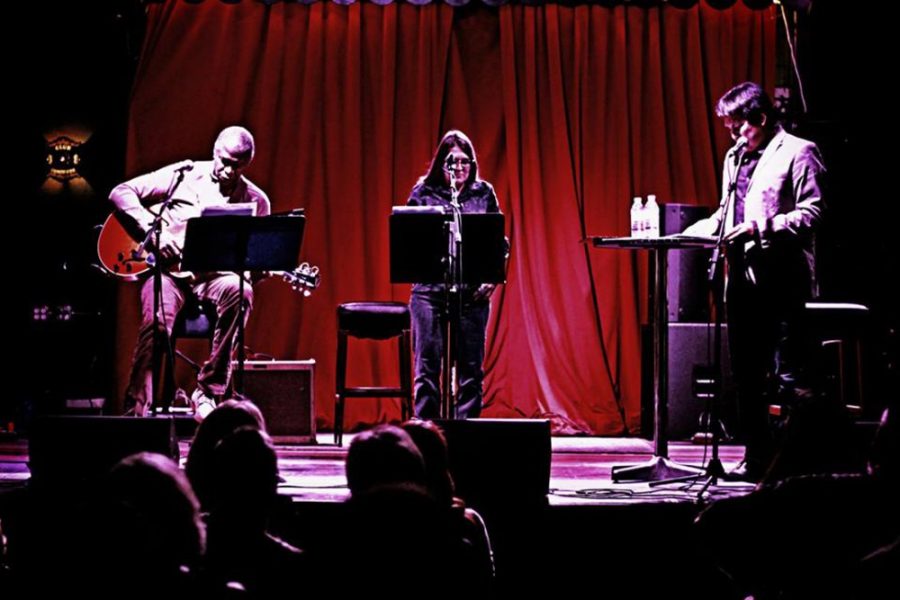In conjunction with National Poetry Month, the annual Tucson Poetry Festival kicked off Thursday and runs until Saturday. A festival born of Arizonan, Southwestern, national and international poetry alike, the Tucson Poetry Festival celebrates its 32nd year in existence.
Each year follows a specific theme and invites poets and performers from across the board to workshop in accordance to the year’s theme. In the past, Poetry and Love, Play, Lies and even Film have taken the stage. This year, however, the theme takes on a new form, one that works to bridge social, psychological and especially physical divides: “Breaking the Border.”
“The theme ‘Breaking the Border’ deals with really examining physical and social constraints, and how we can work to acknowledge and break them,” said Teré Fowler-Chapman, executive director of the Tucson Poetry Festival.
Since its genesis in 1981, the Tucson Poetry Festival has hosted a myriad of the world’s most renowned poets, ranging from Allen Ginsberg to Joy Harjo to Simon Ortiz. The festival invites poets from all over to come to Tucson to share their perspectives through poetry. This year presents a number of new and familiar voices to the scene.
Claudia Rankine, author of “Citizen”; Gabriela Jauregui, author of “Controlled Decay” and founding member of the Mexican publishing collect Sur+; Bob Holman, author of “Sing This One Back to Me”; Hieu Minh Nguyen, author of “This Way to the Sugar”; and Edyka Chilomé, as seen on TEDx and NPR will be among the poets and musicians performing this year. Musical acts include Sock!Fight and Chezale.
“On the board, we always show respect to traditional poetry, but we also want to be able to have a spotlight on experimental themes and styles,” said Ezra Letra, performer and events coordinator of the Tucson Poetry Festival. “Many poets are experimenting with all kinds of media to help redefine where poetry is going; that is breaking the border.”
Hosting a number of workshops, readings, book signings, panel discussions, movie screenings and concerts, the Tucson Poetry Festival provides a whole spectrum of talent to the community. Placing emphasis on accessibility, the festival is a free event for any and all interested in attending.
“We all share the same mission of accessibility,” Fowler-Chapman said. “We strive to maintain that ideal. When I say I want the festival to be for the community, that means it has to be open to everyone. The only way to achieve that kind of accessibility is to make the whole thing free. When you do that, all walks of life are able to experience and support the poetry and the performers.”
In addition to inviting international talent, the Tucson Poetry Festival will also host a “locals only” event, which celebrates the poets and poetry of Southern Arizona. Among the 12 local performers is poet Enrique Garcia, who joined the poetry scene at the age of 15, and is a graduated member of the Tucson Youth Poetry Slam.
“Poetry is political,” Garcia said. “A lot of my writing stems from the Chicano experience, … the Mexican-American experience. I think we’re still trying to find our place in American society, especially in the Southwest. Timing is important, and this year’s theme couldn’t have come at a better time. It’s revolutionary. It supports discovery. It takes a stand. I [think] the idea of breaking the border exists to show us that we’re all the same, sharing the same human experience.”
The festival is hosted at both Hotel Congress and Fluxx Studios. Each day starts with workshopping, transitioning into readings and concluding evenings with signings or concerts. According to Chezale, local R&B/hip-hop artist and first-time performer at the Tucson Poetry Festival, the festival provides a unique forum for artists and community members to engage others and express themselves freely.
“From what I hear, it’s a powerful event for the arts and poetry community in Tucson and beyond,” Chezale said. “This will be my first year participating, so I’m pretty excited. From what I understand, this year’s theme is ‘Breaking the Border.’ Personally, I can interpret this meaning or idea to be breaking all borders of negativity and separation, whether that be personal, political, educational or cultural. I feel like this can fall into play with my work, because my music and artistry is borderless in the sense of people from all backgrounds and walks of life can potentially relate to my message. We are all people with similar experiences, so I believe through art, we can break down the borders that separate us.”
The festival invites poetry-lovers and newcomers alike to join in “Breaking the Border,” as it works to examine and abolish the walls that divide us.
“After going to the festival, people will have heard poetry in a new way,” Fowler-Chapman said. “Their concept of what they thought poetry was [will shift]. They [will] begin to see how poetry takes on many forms. People can just come as they are. This is a sacred thing. Zero judgments, just show up and be.”
_______________
Follow Elise McClain on Twitter.









